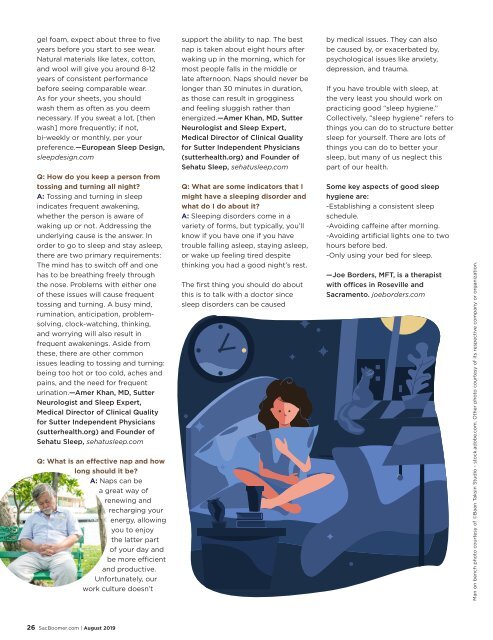BOOMER Magazine: August 2019
Most of the soundtrack of my life is now found only on the oldie’s stations. But you can wander down musical memory lane by reading Boomer’s curated summer playlist (page 45) and let us know if we missed your favorites! Find ways to make sure you get your zzz’s on page 24. As we age sleep becomes even more essential to being healthy (and alert!) each day. You might need some even more relaxing music if your retirement planning has fallen prey to the 7 Sins of Retirement Planning on page 33. These great articles, and more, can be found in this issue of Boomer!
Most of the soundtrack of my life is now found only on the oldie’s stations. But you can wander down musical memory lane by reading Boomer’s curated summer playlist (page 45) and let us know if we missed your favorites! Find ways to make sure you get your zzz’s on page 24. As we age sleep becomes even more essential to being healthy (and alert!) each day. You might need some even more relaxing music if your retirement planning has fallen prey to the 7 Sins of Retirement Planning on page 33. These great articles, and more, can be found in this issue of Boomer!
You also want an ePaper? Increase the reach of your titles
YUMPU automatically turns print PDFs into web optimized ePapers that Google loves.
gel foam, expect about three to five<br />
years before you start to see wear.<br />
Natural materials like latex, cotton,<br />
and wool will give you around 8-12<br />
years of consistent performance<br />
before seeing comparable wear.<br />
As for your sheets, you should<br />
wash them as often as you deem<br />
necessary. If you sweat a lot, [then<br />
wash] more frequently; if not,<br />
bi-weekly or monthly, per your<br />
preference.—European Sleep Design,<br />
sleepdesign.com<br />
Q: How do you keep a person from<br />
tossing and turning all night?<br />
A: Tossing and turning in sleep<br />
indicates frequent awakening,<br />
whether the person is aware of<br />
waking up or not. Addressing the<br />
underlying cause is the answer. In<br />
order to go to sleep and stay asleep,<br />
there are two primary requirements:<br />
The mind has to switch off and one<br />
has to be breathing freely through<br />
the nose. Problems with either one<br />
of these issues will cause frequent<br />
tossing and turning. A busy mind,<br />
rumination, anticipation, problemsolving,<br />
clock-watching, thinking,<br />
and worrying will also result in<br />
frequent awakenings. Aside from<br />
these, there are other common<br />
issues leading to tossing and turning:<br />
being too hot or too cold, aches and<br />
pains, and the need for frequent<br />
urination.—Amer Khan, MD, Sutter<br />
Neurologist and Sleep Expert,<br />
Medical Director of Clinical Quality<br />
for Sutter Independent Physicians<br />
(sutterhealth.org) and Founder of<br />
Sehatu Sleep, sehatusleep.com<br />
Q: What is an effective nap and how<br />
long should it be?<br />
A: Naps can be<br />
a great way of<br />
renewing and<br />
recharging your<br />
energy, allowing<br />
you to enjoy<br />
the latter part<br />
of your day and<br />
be more efficient<br />
and productive.<br />
Unfortunately, our<br />
work culture doesn’t<br />
support the ability to nap. The best<br />
nap is taken about eight hours after<br />
waking up in the morning, which for<br />
most people falls in the middle or<br />
late afternoon. Naps should never be<br />
longer than 30 minutes in duration,<br />
as those can result in grogginess<br />
and feeling sluggish rather than<br />
energized.—Amer Khan, MD, Sutter<br />
Neurologist and Sleep Expert,<br />
Medical Director of Clinical Quality<br />
for Sutter Independent Physicians<br />
(sutterhealth.org) and Founder of<br />
Sehatu Sleep, sehatusleep.com<br />
Q: What are some indicators that I<br />
might have a sleeping disorder and<br />
what do I do about it?<br />
A: Sleeping disorders come in a<br />
variety of forms, but typically, you’ll<br />
know if you have one if you have<br />
trouble falling asleep, staying asleep,<br />
or wake up feeling tired despite<br />
thinking you had a good night’s rest.<br />
The first thing you should do about<br />
this is to talk with a doctor since<br />
sleep disorders can be caused<br />
by medical issues. They can also<br />
be caused by, or exacerbated by,<br />
psychological issues like anxiety,<br />
depression, and trauma.<br />
If you have trouble with sleep, at<br />
the very least you should work on<br />
practicing good “sleep hygiene.”<br />
Collectively, “sleep hygiene” refers to<br />
things you can do to structure better<br />
sleep for yourself. There are lots of<br />
things you can do to better your<br />
sleep, but many of us neglect this<br />
part of our health.<br />
Some key aspects of good sleep<br />
hygiene are:<br />
-Establishing a consistent sleep<br />
schedule.<br />
-Avoiding caffeine after morning.<br />
-Avoiding artificial lights one to two<br />
hours before bed.<br />
-Only using your bed for sleep.<br />
—Joe Borders, MFT, is a therapist<br />
with offices in Roseville and<br />
Sacramento. joeborders.com<br />
https://www.youtube.com/watch?v=Ge_JNGVTSvA<br />
Man on bench photo courtesy of ©Baan Taksin Studio - stock.adobe.com. Other photo courtesy of its respective company or organization.<br />
26 SacBoomer.com | <strong>August</strong> <strong>2019</strong>

















